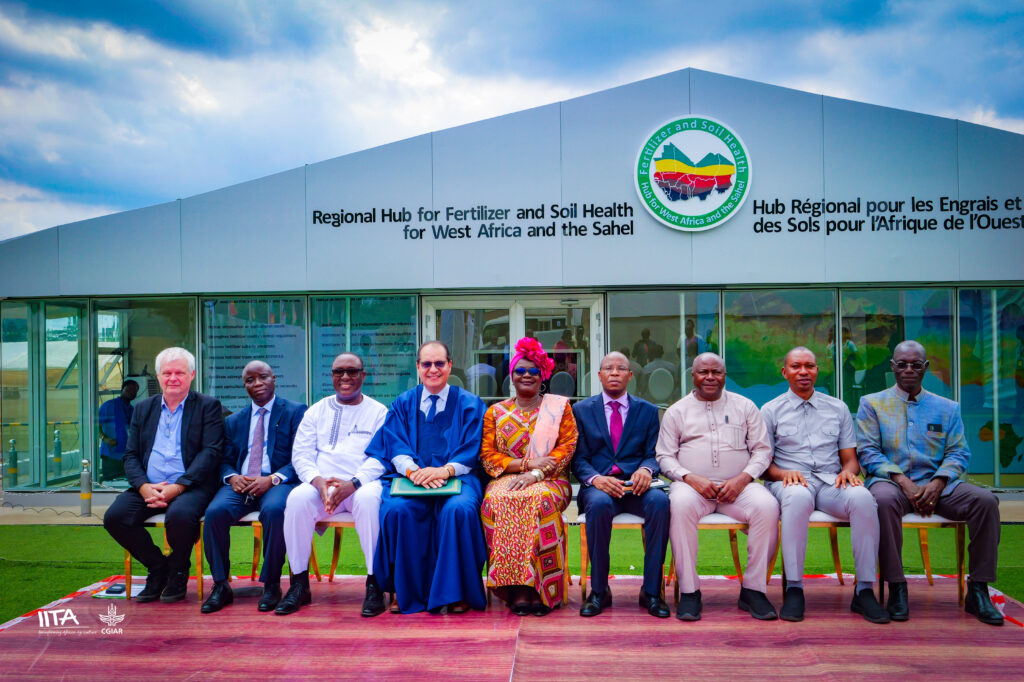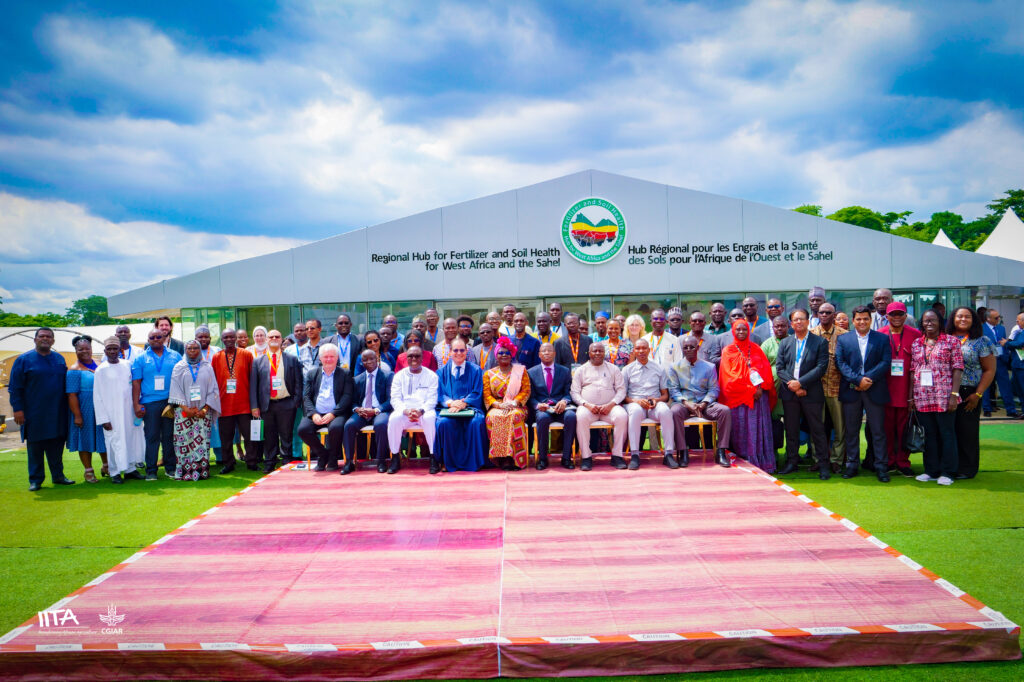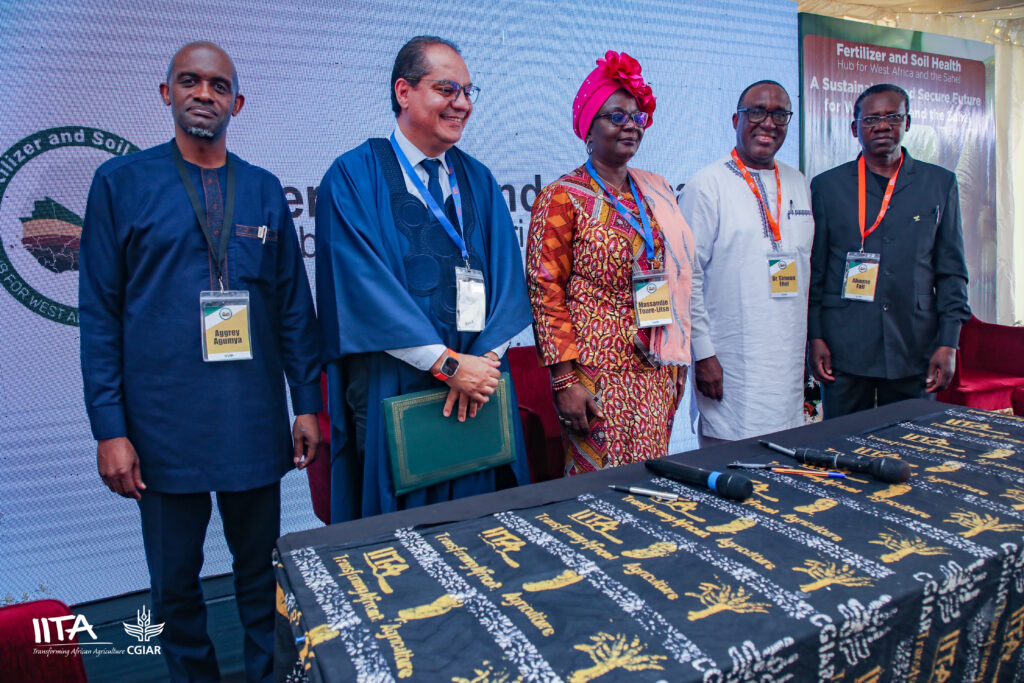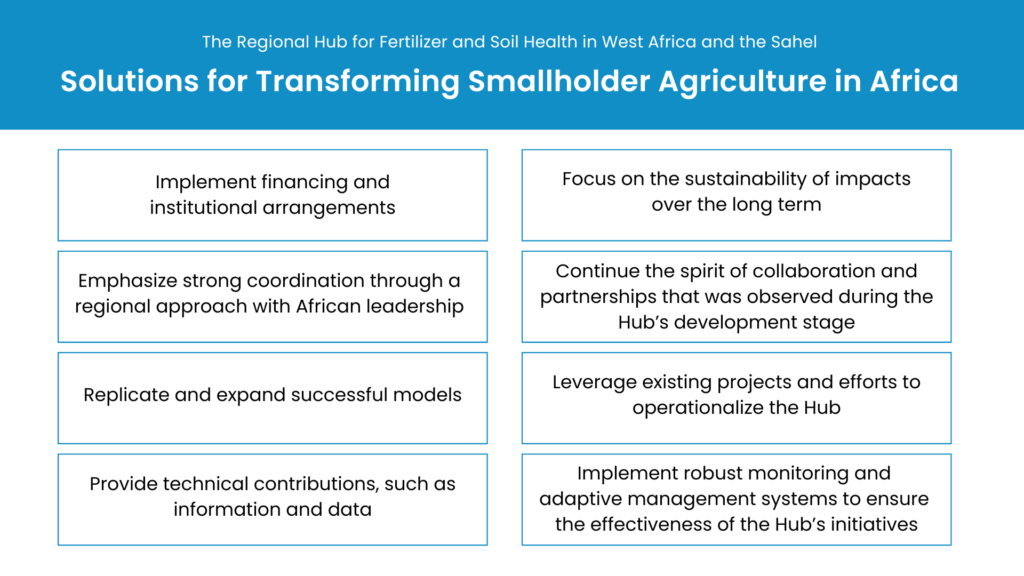
Introduction
The agricultural landscape in West Africa and the Sahel region faces significant challenges, including poor yields, ecosystem degradation, poverty, and resource depletion. To address these issues and drive sustainable change, the Regional Hub for Fertilizer and Soil Health was launched as a collaborative initiative on June 26, 2024.
The Hub is designed to respond to the Soil Initiative for Africa (SIA), the Africa Fertilizer and Soil Health (AFSH) Summit Action Plan, and the 2024 Nairobi Declaration on Fertilizer and Soil Health in Africa.
The Regional Hub addresses the pressing need for strategic guidance, knowledge dissemination, and capacity development in the region. By engaging a diverse coalition of stakeholders–including key organizations such as the Forum for Agricultural Research in Africa (FARA), the International Fertilizer Development Center (IFDC), the African Plant Nutrition Institute (APNI), the International Institute of Tropical Agriculture (IITA), the Accelerating Impacts of CGIAR Climate Research for Africa (AICCRA) project, and OCP Africa–the Hub aims to tackle soil degradation and promote sustainable fertilizer use, ultimately boosting agricultural productivity and livelihoods.
The Executive Director of FARA, Dr. Aggrey Agumya, gave the opening remarks at the launch, emphasizing the relevance of the subregional hubs and acknowledging the ECOWAS Commission for showing leadership; he stated, “This has triggered proactive action from other subregions of the continent.” He also described the four vital soil health and fertilizer areas that will drive the delivery of measurable impact for the continent: effective partnerships, country engagement, innovative coordination, and financing for coordinated action.

Key Objectives and Collaborators
At the core of the Hub’s mission is the goal of driving holistic solutions at scale by engaging entire value chains across country priorities. Through partnerships with institutions like APNI, Mohammed VI Polytechnic University (UM6P), and the World Bank, the Hub is set to revolutionize agricultural practices in West Africa and the Sahel. Dr. Simeon Ehui, Director General of IITA, emphasized that, “The Hub will serve as a center of excellence, a place for knowledge sharing, innovation development, and best practice dissemination.”
West Africa Lead of AICCRA Robert Zougmoré highlighted the vital contributions AICCRA will bring to the Hub as a key knowledge partner by building on existing activities and providing soil information, knowledge management and sharing, agronomy recommendations, capacity development, policy support, and advocacy and awareness creation.
In another speech, Mohamed Anouar Jamali, CEO of OCP Africa, elaborated on the organization’s commitment to enhancing soil health and fertility, saying, “Our support to the Regional Hub will encompass several key areas: development of digital soil health and fertility maps, site-specific soil health and fertility solutions, supporting farmer-led experimentation, and providing technical assistance to operationalize the Hub.”
The launch highlighted ten priority objectives for the Hub:
- Improving Soil Health and Crop Yields
- Data-Driven Decision Making
- Climate Adaptation and Environmental Sustainability
- Partnerships and Collaboration
- Capacity Building and Knowledge Sharing
- Policy Advocacy
- Empowering Farmers and Communities
- Monitoring and Adaptive Management
- Mobilizing Financial Resources
- Regional Cooperation
These objectives aim to transform smallholder agriculture in Africa, focusing on sustainable intensification, climate adaptation, and improving the livelihoods of farming communities.

Engaging the Ecosystem
The Hub’s success hinges on engaging and synergizing the ecosystem in the region, including government ministries, the fertilizer industry, development investors, and technical partners. By establishing national research and extension programs and collaborating with delivery channel partners, the Hub aims to create a sustainable and impactful agricultural transformation.
The Role of the Hub Director
During the launch event, Hub personnel announced that the search for a passionate Director to lead the Hub’s operations in 19 countries is underway. This seasoned leader will spearhead large-scale initiatives, transforming African agriculture and driving impactful change across the continent. The Director’s role is pivotal in ensuring the Hub’s success and efficiency in achieving its objectives.
Conclusion
The launch of the Regional Hub for Fertilizer and Soil Health marks a significant step toward transforming agriculture in West Africa and the Sahel. By addressing critical issues, engaging stakeholders, and driving sustainable practices, the Hub is poised to make a lasting impact on soil health, fertilizer use, and agricultural productivity in the region.
During the launch, participants discussed and prioritized next steps for the success of the Regional Hub. These steps collectively aim to transform African smallholder agriculture by focusing on sustainable intensification, climate adaptation, and improving livelihoods through enhanced soil health and fertilizer management practices.

The Regional Hub for Fertilizer and Soil Health represents a groundbreaking initiative for transforming agriculture in West Africa and the Sahel. By leveraging strategic partnerships, data-driven approaches, and community engagement, the Hub aims to address critical agricultural challenges and promote sustainable practices. The enthusiastic support and collaborative efforts of key stakeholders underscore the Hub’s potential to drive meaningful change, enhance soil health, and improve agricultural productivity. As the Hub progresses, it will play a pivotal role in empowering farmers, fostering innovation, and ensuring a resilient agricultural future for the region.




